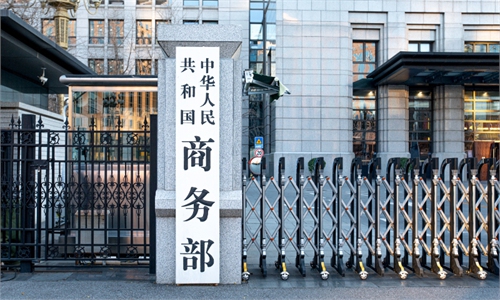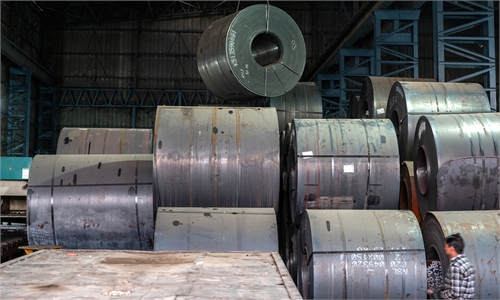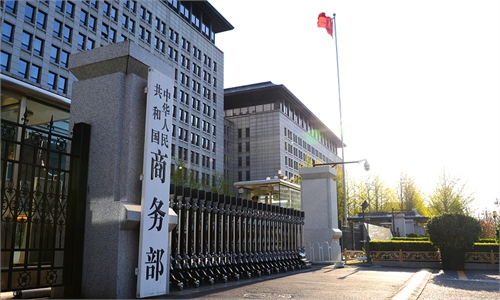China starts to levy anti-dumping duties on Indian cypermethrin; move shows nation’s resolve to safeguard domestic firms’ interests: expert

A villager sprays insecticide over farmland in Beijing's Fangshan District on April 5, 2025. Photo: VCG
Starting from Wednesday, China will impose anti-dumping duties on imports of cypermethrin originating in India for a period of five years, the Ministry of Commerce (MOFCOM) announced. A Chinese expert said this sends a clear signal of the government's firm resolve to protect the legitimate rights and interests of Chinese companies in response to unfair trade practices by countries such as India.
In response to applications from domestic industry, MOFCOM launched an anti-dumping investigation into cypermethrin imported from India on May 7, 2024. During the investigation, the ministry strictly adhered to Chinese laws and WTO rules, extensively consulted relevant stakeholders, fully safeguarded the rights of all parties involved, and reached objective, fair, and impartial conclusions through rigorous analysis, a MOFCOM spokesperson said on Wednesday.
The investigation concluded that imports of cypermethrin from India have involved significant dumping, which caused substantial harm to the domestic industry, and established a causal link between these dumping practices and material injury, the spokesman said. Anti-dumping duty rates will range from 48.4 percent to 166.2 percent, the spokesperson said.
Cypermethrin is primarily used in agriculture to produce insecticides for pest control in crops such as cotton, fruit trees, vegetables, tobacco, corn, and flowers.
The MOFCOM on Tuesday announced a decision to impose anti-dumping duties on imports of cypermethrin from India starting from Wednesday.
China's imposition of anti-dumping duties on Indian cypermethrin is a legitimate trade remedy measure and fully compliant with WTO rules as the findings have shown that India's dumping of the product has significantly disrupted China's domestic market and caused harm to domestic industry, He Weiwen, a senior fellow at the Center for China and Globalization, told the Global Times.
"MOFCOM's move sends a clear signal that the Chinese government is determined to protect the legitimate rights and interests of Chinese companies in response to unfair trade practices by countries like India," He said.
Qian Feng, director of the research department at the National Strategy Institute at Tsinghua University, said India has shown increasing tendency toward resorting to trade remedy measures to block Chinese exports.
Official data showed that India has been the leading country in initiating trade remedy investigations against China for five consecutive years. In 2024, India launched 47 trade remedy investigations, of which 37 targeted China and involved volume of $9.78 billion - both setting a record high. In the first quarter of 2025, India has intensively launched seven anti-dumping investigations against Chinese products.
"India's frequent trade remedy investigations against Chinese products are detrimental to the healthy and orderly development of China-India economic and trade relations," Qian said, noting that Chinese MOFCOM's latest decision serves as a wake-up call regarding India's irresponsible approach.
On April 21, India imposed a 12 percent temporary tariff on certain steel imports, locally known as a safeguard duty, to curb a surge in inexpensive shipments primarily from China, Reuters reported.
Notably, India's move coincided with US Vice President JD Vance's visit to India. According to an Associated Press report, Vance held talks with Indian Prime Minister Narendra Modi on April 21 as New Delhi looks to avoid American tariffs, negotiate a bilateral trade deal with Washington and strengthen ties with the US administration.
"It remains unclear whether India aims to protect its domestic steel industry or to avoid US tariffs. However, it is certain that India will gain no benefits by catering to the US," He Weiwen said.
He said China has been India's largest trading partner for many years and they enjoy great potential in economic and trade potential. "China and India have a combined population of almost 3 billion, while the two economies are strongly complementary. Together, they can expand Belt and Road Initiative cooperation and South-South cooperation," He said.
While India's temporary tariff has a limited impact on Chinese steel industry, it sends a negative signal amid trade tensions between China and the US, Qian said, stressing that as two largest developing countries, China and India should support each other and intensify cooperation, which conforms to the fundamental interests of both people.



